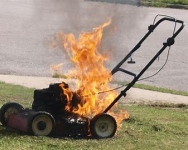Charlie8d
Well-Known Member
- Joined
- Apr 26, 2021
- Threads
- 11
- Messages
- 130
This is my 4th year using my Greenworks 60V tools. I have a 21" self propelled mower & absolutely love it. I have 1/2 acre in Florida that I cut using its 2 batteries that came with the mower, & a double charger. It takes a maximum of 1 hour to full charge these batteries. They will last til I am about 2/3 finished. I have extra batteries that I can then use, or take a break while those are recharging. I love the mower so much that I also bought a String Trimmer, that came with 1 battery & a single charger. I also bought a Blower, hedge trimmer , chain saw, with battery & charger, & a power station. I am still using the original blade , too. The warranty will expire after this season & it has more than paid for itself. This mower cost no more that a good quality gas self propelled mower.
You cannot expect this mower to perform exactly like a gas mower. You should never cut wet grass, or very high grass, which you really shouldn't do with a gas mower, either. It will go as fast as you can walk . I do not gather the mulch, so I cannot tell you how well the included bag works.
I know some people may never part with their gas mowers , which is fine with me. But, I will keep using these tools.
You cannot expect this mower to perform exactly like a gas mower. You should never cut wet grass, or very high grass, which you really shouldn't do with a gas mower, either. It will go as fast as you can walk . I do not gather the mulch, so I cannot tell you how well the included bag works.
I know some people may never part with their gas mowers , which is fine with me. But, I will keep using these tools.

